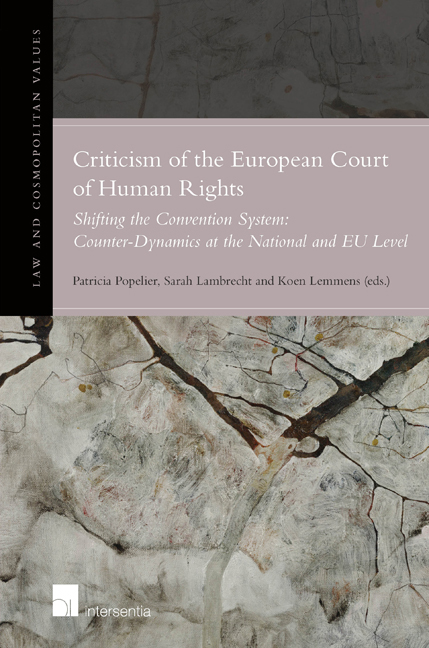 Criticism of the European Court of Human Rights
Criticism of the European Court of Human Rights Chapter 18 - Russia: In Quest for a European Identity
from PART V - HOSTILE CRITICISM
Published online by Cambridge University Press: 13 December 2017
Summary
CRITICISM OF THE EUROPEAN COURT OF HUMAN RIGHTS
As this chapter is being written, Russia's relations with the Council of Europe hit a new low. In July 2015, Russia's Constitutional Court proclaimed a judgment in which it explicitly referred to the supremacy of the Constitution of the Russian Constitution over the ECHR and reserved itself a right to review ECtHR judgments on the subject of their conformity with the Russian Constitution. Earlier, in January 2015, the Parliamentary Assembly of the Council of Europe (PACE) had decided not to restore the voting rights of the Russian delegation in the Assembly until April of the same year, amid the Ukrainian crisis, and in response Russia had moved to pull out of the PACE for a whole year. This new low point in the relationship between the country and the Council of Europe is in no way unprecedented. Russia's vote at the PACE had been suspended previously for several other reasons, last time in 2014, following the annexation of Crimea. The relationship between the two has been turbulent well since Russia's accession to the European Convention of Human Rights back in 1996, with series of further failures in Russia's human rights record only deepening the face-off : the war in Chechnya, death penalty, relations with Georgia, deteriorating human rights record domestically and ultimately the offensive on Ukraine.
The explanations to the country's uneasy relationship with the Council, as well as its Human Rights Court can be drawn from different perspectives. The distinct legal culture, inherited from the ruins of the Soviet Union, a country famous for its skepticism towards some key legal concepts and principles distinguishing the modern democratic society, may shed much light on this. Obviously, Russia's smooth integration into the European legal space is strongly undermined by the prevalence of a legal culture which carries the heavy influence of both continental legal positivism and a heritage of communist legalism branded as “vulgar Marxian positivism”. Russia's legal development is also suffering in the hands of its corrupt political leaders who often attempt to exploit the prevalent patterns of formalism in law to reach their political goals. Russia's legal integration is finally weakened by the institutional design of the judiciary where courts often appear incompetent to apply constitutional principles and the case law of the ECHR due to jurisdictional limitations facing general courts.
- Type
- Chapter
- Information
- Criticism of the European Court of Human RightsShifting the Convention System: Counter-dynamics at the National and EU Level, pp. 481 - 502Publisher: IntersentiaPrint publication year: 2016
- 1
- Cited by


